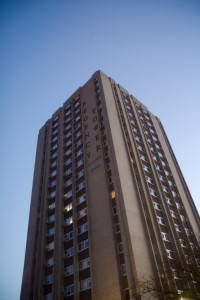 About this series: In October 2012, I moved into a low-income apartment high-rise on Detroit’s lower east side and began to investigate the treatment of residents, most of whom are seniors, veterans or people with disabilities.
About this series: In October 2012, I moved into a low-income apartment high-rise on Detroit’s lower east side and began to investigate the treatment of residents, most of whom are seniors, veterans or people with disabilities.
Eugene Grissom couldn’t wait to get off the streets.
Homeless for years, he turned his life around and found just enough financial help to move into the Regency Towers, a low-income high-rise apartment on the lower east side.
He was paying his bills, getting back on his feet.
Then came the bed bugs – elusive, bloodsucking pests that have infested dozens of other apartments in the building.
Painful sores covered Grissom’s arms and legs. He itched his skin raw. He couldn’t sleep.
“Mr. Grissom was so overly distressed that he was not eating, he lost 10-15 pounds and he had a mental breakdown,” his physician, Dr. Katrice Herndon, said.
No matter what Grissom did, he couldn’t get management to spend the money to eradicate the bugs, as required by law.

Bed bugs are far from the only problem at 1935 Chene, a 20-story building that houses struggling families, fixed-income seniors, people with disabilities and veterans. Residents complaining of cold rooms, leaking roofs, crime, malfunctioning fire alarms, nonworking elevators and lack of hot water have gone unanswered by the St. Louis-based owner and manager of the building, Kohner Properties.
Mailcarriers have been locked out, which is a big problem for people who receive assistance in the mail.
When two fires broke out in the building recently, residents as old as 100 had no idea what to do. Many were incapable of descending the stairs, and some panicked when smoke filled a hallway from a kitchen fire.
In the past two months, the company fired the security and doormen with no explanation, despite rampant crime in the area. Without someone in the lobby to open the door, paramedics, firefighters and cops have been locked out of the building for as long as 15 minutes. One night, while walking my dogs, I saw two paramedics who had been waiting so long that the 911 caller had since become unresponsive.
“You guys are going to have a death on your hands with this,” one of the irritated paramedics told me as I let him in.
Getting this message to Kohner Properies has been next to impossible. For the past 10 days, on-site management has not shown up to work. Corporate headquarters won’t respond.
In the meantime, Bernard Ragin, 41, wishes he never moved back to Detroit.
buy cytotec online https://cpff.ca/wp-content/languages/new/canadaa/cytotec.html no prescription
His apartment is infested with bed bugs, and he can’t get management to respond. He’s worried his new furniture will need to be destroyed.
“It’s embarrassing” he said of the bed bugs. “I can’t really have friends or family visit. I’m just stuck here with bed bugs.”
Check back for updates.
Got tips or suggestions? Contact Steve at [email protected].
Steve Neavling is an investigative journalist, a freelance reporter for Reuters and former city hall reporter for the Detroit Free Press. Neavling explores corruption, the difference makers and the underbelly of an oft-misunderstood city.
Follow us on Twitter and Facebook for daily updates, investigations and photos of the Motor City.
Steve Neavling
Steve Neavling lives and works in Detroit as an investigative journalist. His stories have uncovered corruption, led to arrests and reforms and prompted FBI investigations.

Pingback: Second-alarm blaze breaks out at 20-story apartment building in Detroit | Motor City Muckraker